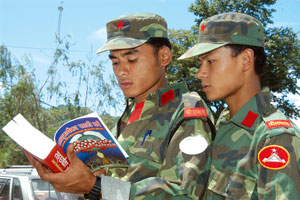 MIN RATNA BAJRACHARYA |
The day after the keys of arms containers were handed over to the Special Committee last month, vice-chairman Mohan Baidya announced a nationwide campaign against the decision.
Half a dozen central committee members leading a few hundreds supporters enforced a transportation strike and held torch rallies. The group boycotted the party's standing committee meeting.
Since then, rival factions of the Maoists have locked horns all over the country, sometimes with violent outcomes that have left many injured. It all happened within three days since the Maoist-led government was formed on 29 August and less than a week after the party had unanimously decided to hand over the keys of the arms containers to the Special Committee if a government under the party's leadership was formed.
"We supported Baburam because we thought he would not surrender before the state, but he let us down," Netra Bikram Chand, a Baidya-loyalist told Nepali Times in an interview. He said it is essential for a party to have an intra-party debate to protect the purity of its ideology. Chand wants the the 4-point agreement revised. He denied that the party is headed for a split, but insisted his side was right and the other side was wrong and the disagreement would continue as long as the issue was not addressed. He rules out integration before the Maoists have a "people's rule".
However, the commander of the PLA's Fourth Division and member of the Armed Integration Special Committee, Tej Bahadur Oli, told us the long-delayed "regrouping" that is supposed to precede integration will begin next week. "We have been given one week to decide on the number to be integrated, modality and rehabilitation package. Once we reach an agreement, it should begin immediately," he said.
Speaking to Oli, one is puzzled what the hardliners are arguing about. He says the debate on the hand over of the keys is a storm in a tea cup because the decision was made in consultation with the PLA and they don't feel disbanded or dissolved.
"If you really want to know, we disarmed the very day when the weapons were locked in the containers. But we did it for the people for whom we took up arms in the first place, so we have no regrets," Oli said, adding that he had visited all seven cantonments and found ex-fighters positive about their government's decision.
However, the intensity of opposition to the handover seems to differ depending on whether a cantonment commander is loyal to the Baidya or Dahal faction, with the hardliners regarding the keys handover as a symbolic surrender. (See interview and an analysis, overleaf.)
"We have sacrificed as much for change as anybody else and the only thing we ask for in return is acknowledgement and respect," Oli quoted an ex-fighter in a cantonment as telling him recently.
But there is another problem. Even the moderate Maoists leading the government feel the NC and UML have gone back on their commitments on integration. "We have handed over weapons, we have returned most seized property, we have even said we are flexible on integration numbers. What more do they want as proof of our commitment?" he asks. "It's time the NC and UML prove their part of the bargain by coming to the table with intention to find a solution."
Questioned about districts where seized property is not being returned, Basnet said the party can't take responsibility for property seized by non-Maoists in the Tarai.
The prime minister's political advisor Devendra Poudel is optimistic the integration process will begin next week. He said: "Some comrades want to throw the baby out with the bath water, we can't let that happen. Our commitment to peace and constitution remains firm."
Read also:
The next People's War?, SIMON ROBINS in BARDIYA
A significant faction of the Maoist party remains committed to armed revolution
Key questions, ANURAG ACHARYA
Handing over the keys to weapons containers has sparked an open mutiny in the Maoist party


